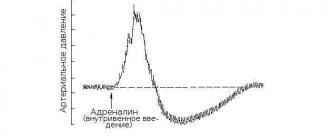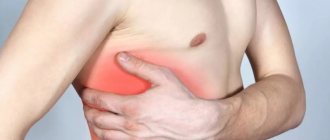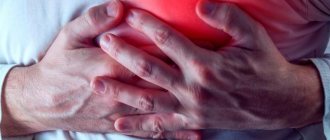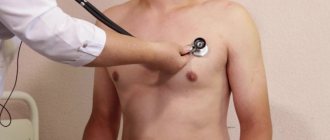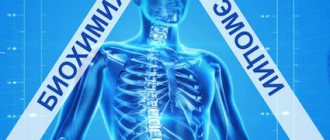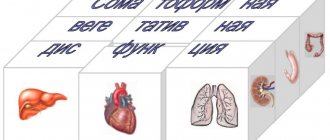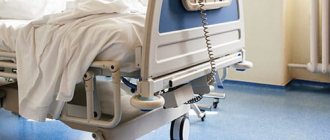Why does my heart hurt after excitement?
A psycho-emotional disorder of any origin (failure at work, loss of loved ones or watching an exciting film) is a significant burden on the body.
As a result of exposure to a stress factor, the brain sends a signal to the peripheral organs of the sympathoadrenal system - the adrenal glands. Their brain matter releases adrenaline and norepinephrine into the blood. Due to a hormonal surge, a number of changes occur:
- vasoconstriction (narrowing of peripheral vessels), including coronary ones;
- centralization of blood flow to vital organs (brain, heart, lungs);
- stimulation of special receptors in the heart, blood vessels, bronchioles and adipose tissue.
Such pathophysiological changes lead to increased blood pressure, tachycardia (rapid heartbeat), rapid breathing, and pale skin.
Pain appears with irradiation, shortness of breath, tremor, dizziness, up to loss of consciousness.
The breakdown of adipose tissue leads to an increase in heat production. The body tries to maintain normal body temperature by releasing heat, which is why excessive sweating occurs.
The myocardial need for oxygen increases, but due to spasm of the coronary arteries (those that supply the heart) during diastole, not enough blood is supplied. Thus, demand exceeds capacity, which provokes ischemia. Against this background, chest pain occurs with symptoms of angina pectoris.
How does a person with anxiety disorder behave?
Since a person constantly scrolls through negative thoughts in his head, the first sign of an anxiety disorder will be the fact that his thinking slowly but surely becomes pessimistic. And he begins to see only the bad in everything, as if through a distorted mirror. If the ambulance is near the entrance, then it must be to his family; if the husband/wife is late after work, it means an accident has happened. Such a person will definitely pick up only negative information from the radio or TV in the background and in any situation, even positive at first glance, will find more negative things or consequences. A person in the grip of an anxiety disorder will be fussy and impatient. Waiting for something is an unbearable burden for him. He will also constantly feel muscle tension, which is why he literally will not be able to relax.
Symptoms of an anxiety disorder include irritation and anger. This will be a person's first reaction to everything that happens. He will make critical remarks, be ironic, ridicule, or simply be rude. And to the question: “why are you reacting so strongly?”, the answer will invariably be: “I react normally.”
What not to be confused with
Neurosis is a common cause of pain in the heart, but not the only one. Many factors provoke this symptom:
- Hormonal changes during pregnancy, menopause, and adolescence. When estrogen levels change, the pain can be stabbing, aching, bursting, pressing or cutting.
- Viral and bacterial infections.
- Harmful production.
- Sexual disorders.
- Increased activity of the thyroid gland (various heart pains, rapid heartbeat, irritability, the patient’s hands tremble).
- Smoking, because nicotine constricts blood vessels. Coffee has the same effect, so those who like to drink several cups of strong espresso should think about the consequences.
- Climate change leads to vasospasm, which is manifested by chest pain, increased blood pressure, and dizziness.
- Alcohol intake activates the sympathoadrenal system, increases heart rate and oxygen starvation of the myocardium.
- Spinal pathologies. Noncardiac causes of pain include pinched nerve roots, hernia formation, and injuries at the level of the cervical and thoracic regions.
- Breast diseases are accompanied by aching pain in the chest.
- Disturbances in the functioning of the diaphragm, esophagus, bronchi and mediastinal organs cause pain in the heart area that is not associated with stress.
- Mitral valve prolapse causes vegetative attacks.
- Arterial hypertension with the development of a crisis is accompanied by flashing spots or blurred vision, and headache. The person is very sick.
- Vegetative-vascular dystonia (also called neurocirculatory) has more than 100 symptoms, including asthenia, insomnia, anxiety, cardialgia, a feeling of lack of air, disorders of the gastrointestinal tract and genitourinary system.
Clinical manifestations alone are not enough to make a final diagnosis and find out the true causes of heart pain. In this case, the survey, inspection and necessary examinations are carefully carried out.
What to do
If your heart hurts after stress, you need to rule out death-threatening conditions (myocardial infarction, angina). Whatever the cause of cardialgia, you should immediately stop physical activity, lie down, calm down, and ensure sufficient fresh air. The next step is to take Nitroglycerin under the tongue. When your heart hurts from anxiety, nitro drugs will not give the desired effect. A quick result can be achieved by taking “Barboval”, “Valocordin” drops or analog tablets: “Corvalment”, “Corvaltab”, “Validol” and others.
To treat neurosis, traditional medicine offers a large number of herbal infusions, which are brewed as tea. People often use herbal sedatives (extract of valerian, hawthorn, motherwort) in other dosage forms. But traditional (scientific) methods indicate the need to consult a psychotherapist. Sometimes a nervous breakdown so reduces the quality of life and is so difficult to correct that it is necessary to take antidepressants.
Panic attacks often occur at night. At such moments, a person’s fear of death dominates, it becomes difficult for him to breathe, and his body becomes covered in cold sweat. The attack can be stopped with phenobarbital drugs (Corvalol and its analogues).
The key to treatment is to understand the “inside” of the problem. A person needs to realize that there is no factor of external harm, and the source of discomfort is the fruit of the work of his own brain. It is necessary to calm down and learn to control yourself, and, as international recommendations correctly note, it is difficult to do this without the help of a specialist. Regular observation by a psychotherapist, then by a psychologist, allows the patient to understand his problems and be able to reflect on them, which prevents neurotic outbursts.
An important point in the treatment of chronic stress is lifestyle modification. Anyone who has a heartache from anxiety is advised to stick to a daily routine, get enough sleep, and eat a balanced diet. A change of environment—travel, vacation—helps well. If work is a constant provocateur of worries, you should think about changes.
The effect of negative emotions on the heart
The term "emotion" comes from the Latin emovere, which means "to excite, excite." Emotions are known to cause excitement and increased activity of a huge number of brain structures, like a storm, involving many organs and systems in intense activity. This storm sometimes mercilessly falls primarily on the cardiovascular system of the body, causing many diseases.
Scientists have found that negative emotions such as anger, anger and rage can be deadly for people who already have heart disease.
Classification of emotions
There are different classifications of emotions, but we are now interested in emotions from the point of view of their influence on the heart, so we will divide all emotions into three groups:
- positive;
- negative sthenic;
- negative asthenic.
Negative emotions are divided into:
- sthenic (this is anger, indignation, rage); arise and occur with an increase in energy activity, they mobilize the body's resources, stimulate the activity of the muscles, nervous and cardiovascular systems.
- asthenic (melancholy, fear, horror); occur against the background of suppression of the body’s energy and intellectual potential, suppression of mental activity, muscle activity, inhibition of any response of the body.
Thenic and asthenic emotions affect the heart differently. For example, if with melancholy and fear the blood flow in the vessels of the heart worsens, then with anger and rage, on the contrary, it increases.
Researcher in the field of experimental cardiology G.I. Kositsky considers sthenic and asthenic emotions to be manifestations of one single process that arises in response to changing environmental conditions, which he calls a state of tension (ST).
State of tension
There are four stages of heart failure:
- The stage of mobilization of the body's reserves (in response to some situation) - stimulation of the nervous, endocrine and cardiovascular systems, increased brain activity, increased muscle tone and strength, and the level of energy metabolism. This is often accompanied by an increase in mental performance and mood, the mechanisms of probabilistic thinking are activated, a state of inspiration, insight, and high creative activity arises.
- Stenic negative emotions (if our body “believes” that the situation is critical and will require a large expenditure of strength and energy) is an extreme strengthening of all systems responsible for interaction with the external environment. Muscle tone, strength, and endurance increase sharply. All energy processes are sharply mobilized. The activity of the heart increases, blood pressure, ventilation of the lungs, and the release of adrenaline increase. Immunological reactions intensify, etc. But, unlike the first stage, the mobilization of resources does not occur selectively (economically, expediently), but violently, excessively, redundantly and not always adequate to the situation.
- Asthenic negative emotions (if the body “believes” that the situation is emergency and the resources at its disposal are obviously insufficient for an adequate response and therefore the mobilization of these resources is practically useless) - all types of performance sharply decrease, severe fatigue and inhibition of the cerebral cortex occur. Immunological reactions are inhibited, cell restoration processes are inhibited, memory loss is noted, and the ability to think, make decisions, and assess the situation is suppressed.
- Neurosis is the last stage of HF, when the balance of processes in the cerebral cortex is disturbed, then the “vegetative storm” (i.e., that complex of manifestations of the restructuring of the body that was described above), characteristic of the third stage, turns into “chaos” (if in Only strictly defined organs and systems that are part of the “program” of restructuring the body are subject to “storm” excitation (or oppression), then in “chaos” there is not even the semblance of a system or program). There is a sharp loss of performance, behavioral reactions and regulation of internal organs are disrupted, and cardiovascular diseases develop.
Methods of dealing with the consequences of negative emotions
The stage of mobilization of the body's reserves does not require correction, since negative consequences do not accumulate. Moreover, this stage is a training stage, stimulating adaptation processes, subject to more or less periodic occurrence.
With sthenic negative emotions, the only physiologically justified way to discharge is physical activity - fast walking, running, etc. In this case, muscle work leads to vasodilation and a decrease in total blood pressure, and increased oxidative processes contribute to the accelerated destruction of adrenaline, muscle fatigue stimulates the occurrence of inhibition processes in the central nervous system.
True, you can’t lose your head - the load must be adequate to the condition and fitness of the body. Just imagine what will happen if an unprepared person in a state of passion runs on foot to the 9th floor.
It should be noted, in addition, that shouting, swearing, “taking out evil” cannot be justified not only from a moral and ethical standpoint, but also from a medical one, since this does not lead to a complete release of tension, and if after this there remains a feeling of dissatisfaction with one’s own lack of restraint, feelings of guilt, then the accumulation of negative emotions only intensifies, and resistance to stress loads decreases. You can use soothing herbs - valerian, motherwort.
Prevention of stage 2 heart failure consists of normalizing the balance of inhibition and excitation processes in the nervous system. A person who knows this peculiarity of his response to stress should regularly receive a sufficient amount of B vitamins; during and before possible stressful situations (exams, for example), small amounts of sedatives, both natural and, according to indications, synthetic origin, can be taken. full, sufficient sleep and physical activity (even short-term and low-intensity exercise is allowed, but always in the fresh air).
With asthenic negative emotions, first of all, it is necessary to raise the tone of the body and, above all, the nervous system to a relatively normal level. In this case, physical activity no longer causes relaxation or relieves tension.
A person needs drugs that stimulate metabolism in the body and nervous system. Preparations containing phospholipids, which are involved in the metabolism of nerve cells, often help well. Multivitamin preparations with antioxidant properties are necessary.
Extended sleep is indicated. In this case, the use of valerian and motherwort is less justified than hawthorn or peony, since the latter drugs, having a mild sedative effect, do not enhance inhibition processes in the brain. And, of course, professional help from a psychologist or psychotherapist is needed.
With neurosis, a person needs to seek qualified help from a doctor.
Based on materials from profilaktika.tomsk.ru
How to reduce the number of seizures
If your heart often hurts due to worry, first of all undergo a cardiac check-up . This is a set of examinations that will allow you to exclude cardiovascular pathologies. Once you are convinced of satisfactory organ function, you can begin to look for a psychotherapist.
What to do if the emotional problem is clear? Experts advise starting to lead an active and interesting daily life. Try to do things that bring positive emotions, not forgetting about rest and healthy eating. It is beneficial to eat large amounts of fruits, vegetables, fish, and nuts. You need to replace sunflower oil with olive oil, exclude chips, soda and smoked foods.
It is recommended to increase the body's resistance by hardening. Patients whose heart hurts from excitement can take a contrast shower, douse themselves with cold water, or go winter swimming. In this way, resistance to stress hormones is developed and the reaction to what is happening around becomes calmer.
It is worth fighting inactivity with daily walks, swimming, jogging, fitness, yoga, cycling and rollerblading. These activities will relieve not only worries, but also excess weight.
Spa centers also offer a wide range of relaxation treatments. Aromatherapy and massage are effective.
